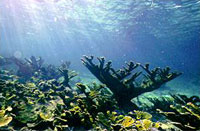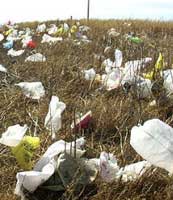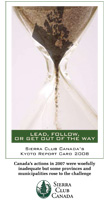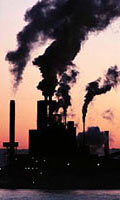
News |
- Census to Measure China's Pollution
- Largest Marine Protected Area
- Rising Food Prices Cause Crisis
- Britain to Reduce Plastic Bag Use
- Atlas Shows Climate Change Affects Birds
- Kyoto Report Delivers Failing Grade for Canada
- More Disclosure Of Environmental Risks
- Manitoba Hydro Seeks New Exports to Minnesota
- Manitoba Lists Polar Bears as Protected
- Manitoba NDP Endorses Auditor General Hogs Report
- Reducing B.C.'s Carbon Footprint through Taxes
- Tax and Trade - Carbon no Longer 'Free'
| Census to Measure China's Pollution | 13 March 08 |
 A nationwide census of polluters in the China has begun. The census will focus on industrial, agricultural and residential pollution. A nationwide census of polluters in the China has begun. The census will focus on industrial, agricultural and residential pollution. China's State Environmental Protection Administration (SEPA) and Ministry of Agriculture will conduct the 'million census', covering 333 cities and 2,895 'counties'. Data collected is to provide a clear picture of China's pollution problem and help government develop new policies. China officials warn companies will be punished if amounts and kinds of pollutants are not accurately reported. Companies and institutions are promised immunity from pollution fines or prosecution for data provided. China is facing environmental deterioration resulting from rapid economic development. According to SEPA, sulfur dioxide emissions in 2005 were 27.8 percent higher than in 2000, 26 percent of surface water is totally unusable due to pollution, and 62 percent is unsuitable for fish. The census is another of China's environmental efforts, which include banning plastic bags and regulating car emissions, in order to meet the World Health Organization's air quality standards in Beijing for the Olympic games. View March 8, 2008 United Press International article View February 27, 2008 BBC News article View February 29, 2008 BBC News article View February 26, 2008 BBC News article View January 10, 2008 China View article View January 5, 2008 China Daily article Sources: United Press International, BBC News, China View, China Daily |
|
 Print version Print version |
Top |
| Largest Marine Protected Area | 13 March 08 |
 The world's largest marine protected areas has been established by a small Pacific Island Nation of Kiribati. On January 30, 2008 Phoenix Islands Protected Areas (PIPA) was doubled in size, becoming the largest marine protected area on Earth. The world's largest marine protected areas has been established by a small Pacific Island Nation of Kiribati. On January 30, 2008 Phoenix Islands Protected Areas (PIPA) was doubled in size, becoming the largest marine protected area on Earth.The 410,500 square kilometers of PIP conserves one of the richest marine feeding and spawning areas in the world, located in the Pacific Ocean between Hawaii and Fiji. The ecosystem, nearly uninhabited by humans, consists of eight coral atolls, two submerged reef systems, underwater mountains, and other deep-sea habitat. The area is globally important for seabird nesting populations, and habitat for more than 120 species of coral and 520 species of fish. To maintain the protected area Kiribati has developed an endowment system to compensate for lost commercial fishing revenues. Visit Phoenix Islands Protected Area website View February 22, 2008 Science Daily article View February 14, 2008 Conservation International article View February 15, 2008 New Kerala article View February 13, 2008 Associated Press article Sources: Science Daily, Conservation International, New Kerala, Associated Press, Phoenix Islands Protected Area website |
|
 Print version Print version |
Top |
| Rising Food Prices Cause Crisis | 11 March 08 |
 Price increases of basic commodities like corn, wheat, rice, and beans threaten to cause a crisis of major proportions for many developing areas. Price increases of basic commodities like corn, wheat, rice, and beans threaten to cause a crisis of major proportions for many developing areas.Developing countries are being hit hard by rising commodity prices and so is the UN World Food Programme (WFP). Food assistance organizations are gearing up to feed millions more on skyrocketing budgets. With food costs for 2008 up by US $500 million, totaling US$3.4 billion, the WFP is desperate for donations. Global food prices have increased by 40 percent since June 2007. In Afghanistan wheat prices have risen 70 percent. A total of 2.55 million Afghans have moved into the category of 'high food insecurity' due to food prices. Rising food prices are a caused by a multiple of factors including:
View March 6, 2008 BBC News article View March 6, 2008 World Food Programme press release View March 4, 2008 BBC News article View March 3, 2008 CTV article View February 26, 2008 World Food Programme press release - Key points View February 26, 2008 World Food Programme press release View February 25, 2008 BBC News article View February 15, 2008 Financial Post article Sources: BBC News, World Food Programme, Financial Post, CTV news |
|
 Print version Print version |
Top |
| Britain to Reduce Plastic Bag Use | 11 March 08 |
 British Prime Minister Gordon Brown signals potential government regulation to reduce plastic bag use if voluntary action is not taken by retailers. British Prime Minister Gordon Brown signals potential government regulation to reduce plastic bag use if voluntary action is not taken by retailers.An estimated 13 billion plastic bags are given out by retailers in the UK each year, each one taking over 1,000 years to decay. "I am convinced we need to act - and the time to act is now," said Prime Minister Brown "And I want to make clear that if government compulsion is needed to make the change, we will take the necessary steps. We do not take such steps lightly - but the damage that single-use plastic bags inflict on the environment is such that strong action must be taken." Mr. Brown encourages retailers to follow the lead of Ikea who no longer provide single-use plastic bags, and Marks and Spenser who implemented a charge for each bag. Money raised goes to environmental charities. Worldwide, countries and retailers reducing the use of plastic bags: South Africa - ban on thinner plastic bags, levies for thicker ones California, US - supermarkets are required to take back and recycle plastic bags China - free plastic bags banned, production of ultra-thin bags will be stopped Australia - will phase out free plastic bags by end of 2008 Italy - plans to ban plastic bags starting in 2010 Belgium - imposed tax on free bags in 2007 View February 29, 2008 BBC News article View February 29, 2008 The Guardian article View February 28, 2008 BBC News article - Stores to charge View February 28, 2008 BBC News article - World bag bans Source: BBC News, The Guardian |
|
 Print version Print version |
Top |
| Atlas Shows Climate Change Effects Birds | 11 March 08 |
 The new Climatic Atlas of European Breeding Birds suggest urgent action is needed to avoid devastating climate change impacts on bird species. The new Climatic Atlas of European Breeding Birds suggest urgent action is needed to avoid devastating climate change impacts on bird species. Climate change and rainfall patterns can greatly alter migration, breeding, behavior, and even genetic composition of birds. Atlas projections were based on the effects of a likely 3 degree Celsius increase above pre-industrial levels in average global temperature. The atlas shows potential distribution for bird species in Europe would shift nearly 550km northeast and be reduced by a fifth of its current size. Models indicate 75% of Europe's nesting birds will face declined ranges. Worldwide birds species are experiencing changes, particularly in Arctic regions where sea ice and tundra is shrinking rapidly. Up to 15% of the world's birds breed in the Arctic. Reducing greenhouse gas emissions now will slow climatic effects and help wildlife adapt. Nature conservation is also needed to protect current and potential bird habitats. Visit Climatic Atlas of European Breeding Birds published Lynx Editions View Atlas Summary - Birds on the Move: Introducing a Climatic Atlas of European Breeding Birds (PDF) Visit European Bird Census Council View January 15, 2008 BBC News article View January 15, 2008 Bird Life article View Nature Canada - Climate Change and Birds pages Sources: BBC News, Bird Life, European Bird Census Council, Nature Canada |
|
 Print version Print version |
Top |
| Kyoto Report Delivers Failing Grade for Canada | 06 March 08 |
 Sierra Club Canada released its third annual Kyoto Protocol report card Lead, Follow or Get out of the Way during February 2008. The report criticizes Canada for refusing to place caps with firm targets on industrial emissions and restricting progress on climate change. Sierra Club Canada released its third annual Kyoto Protocol report card Lead, Follow or Get out of the Way during February 2008. The report criticizes Canada for refusing to place caps with firm targets on industrial emissions and restricting progress on climate change.Canada is the only country to sign the Kyoto Protocol and then announce it would not honor its commitments. The report recommends Canada establish a tax or cap and trade system of at least $30 per tonne of carbon dioxide by 2009, increasing to $75 per tonne by 2020. Sierra Club Canada applauded the governments of Quebec and British Columbia for becoming leaders on climate change policy and carbon tax regimes. Quebec has regulated automobile emissions to match California standards and is proposing to implement its own standards by 2010. Also over 150 Canadian municipalities have joined a national movement called Partners for Climate Protection. "The federal government is being bypassed by provincial governments and by municipal governments in their commitment to stopping catastrophic climate change," said Stephen Hazell, executive director of the Sierra Club. View Sierra Club of Canada- 2008 Kyoto Report Card View February 13, 2008 Sierra Club Canada release View February 12, 2008 Canwest News article View February 13, 2008 Canadian Press article View February 13, 2008 National Post article Sources: Sierra Club Canada, Canwest News, Canadian Press, National Post |
|
 Print version Print version |
Top |
| More Disclosure Of Environmental Risks | 06 March 08 |
 Canadian companies are inadequately reporting their environmental risks, according to the Ontario Securities Commission (OSC) report. Canadian companies are inadequately reporting their environmental risks, according to the Ontario Securities Commission (OSC) report.OSC, Canada's biggest stock market regulator wants companies to include potential environmental costs and liabilities in financial statements. The OSC report examined environmental reporting by 35 companies and the detailed disclosures provided in financial statements and management reports. The review found most companies issue the same "boilerplate" information about environmental risks and do not meet reporting requirements. Many companies failed to measure how their bottom line could be affected. The OSC looked at the these reporting categories: environmental liability; the costs of closing assets (factories, mines etc), the financial cost to meeting environmental protection laws; and the cost of policies fundamental to operations, such as protecting water quality and preventing chemical spills. View February 27, 2008 Ontario Securities Commission release View February 29, 2008 Ontario Securities Commission Environmental Reporting (PDF) View February 28, 2008 Globe and Mail article View February 28, 2008 National Post article View February 27, 2008 Canwest News article Sources: Ontario Securities Commission, The Globe and Mail, National Post, Canwest News |
|
 Print version Print version |
Top |
| Manitoba Hydro Seeks New Exports to Minnesota | 04 March 08 |
 Construction of new hydro dams and expansion of wind power capabilities in Manitoba are needed to meet Minnesota's hydro electricity import expectations. Construction of new hydro dams and expansion of wind power capabilities in Manitoba are needed to meet Minnesota's hydro electricity import expectations.Manitoba Hydro has signed a 'term sheet' with Minnesota Power, an Allete Inc unit, to provide 250 megawatts of hydro power over a 15 year period starting in 2020. The companies have one year to complete talks and sign agreements. Minnesota Power and Manitoba Hydro currently do business under a 50 megawatt agreement expiring in 2015. Manitoba Hydro has existing contracts with Xcel Energy in Minnesota, including a contract that expired and was renewed in 2005. Xcel Energy currently receives 375 megawatts of power under the new 10-year contract with Manitoba Hydro. "Uncertainty about Manitoba Hydro's ability to build the Wuskwatim projects, combined with soaring construction costs, and requirements for Minnesota electricity imports to be approved by its Legislature means more public information is needed about this 'term sheet'," said Gaile Whelan Enns, Director, Manitoba Wildlands. Once finalized, the Minnesota Power sale requires construction of new hydroelectric facilities and a cross-border transmission line. Manitoba Hydro plans include constructing Keeyask generation station on the Nelson River, about 30 kilometres west of Gillam, Manitoba. Keeyask, a $3.5 billion generation station, will supply 620 megawatts of energy. View January 29, 2008 Reuters article View January 29, 2008 Manitoba Government press release View January 29, 2008 Manitoba Hydro press release View January 29, 2008 Minnesota Power release (PDF) View Manitoba Hydro Electric Board 2007 Annual Report (PDF) View January 29, 2008 CBC article View December 23, 2002 PlanetArk article View January 29, 2008 Clean Tech article Sources: Manitoba Government, Manitoba Hydro, Reuters, Minnesota Power, Planet Ark, Clean Tech |
|
 Print version Print version |
Top |
| Manitoba Lists Polar Bears as Protected | 04 March 08 |
 In February 2008 Manitoba's Conservation Minister announced that polar bears would be listed as " threatened" under Manitoba's Endangered Species Act. The regulation unther the Act does not include "the preservation and survival of the habitat of an endangered species." In February 2008 Manitoba's Conservation Minister announced that polar bears would be listed as " threatened" under Manitoba's Endangered Species Act. The regulation unther the Act does not include "the preservation and survival of the habitat of an endangered species."Listed by the World Conservation Union as threatened due to loss of sea ice in 2006, polar bears are found around Hudson's Bay, including waters inside Manitoba jurisdiction. In 1996 Wapusk (Cree for white bear) national park was established by Canada and Manitoba, with close to one million hectares protected. Steps to protect Manitoba fjords, lowlands adjacent to the national park, and Hudson's Bay waters are still outstanding. Polar bear dens are located both inside and outside current protected areas in northeastern Manitoba. Although the government announcement claims differently, many dens are not protected from development, despite being inside candidates for protection designed by Manitoba Conservation. Controversy and court cases continue in the United States regarding listing of polar bears as endangered where populations are located in Alaska. View World Conservation Union Red List 2007 - Polar Bear listing View Manitoba Endangered Species Act regulation (PDF) View February 7, 2008 Manitoba government press release View Manitoba Endangered Species Act Visit Wapusk National Park website Sources: World Conservation Union, Manitoba Government |
|
 Print version Print version |
Top |
| Manitoba NDP Endorses Auditor General Hogs Report | 27 February 08 |
 At its February 2008 annual convention, the Manitoba New Democratic Party passed a resolution telling the NDP government to maintain its moratorium on new industrial hog barns. The resolution also asked the government to act on recommendations from the Manitoba Auditor General's investigation of the industry. At its February 2008 annual convention, the Manitoba New Democratic Party passed a resolution telling the NDP government to maintain its moratorium on new industrial hog barns. The resolution also asked the government to act on recommendations from the Manitoba Auditor General's investigation of the industry.A report from Manitoba Clean Environment Commission, based on a reference to investigate issued by Manitoba's Conservation Minister, is expected to be released soon. The government extended the moratorium or pause in development for this industry to February 29, 2008. Mr. Bill Harrison, a sponsor of the resolution, told Manitoba Wildlands, "There are some forty recommendations to be implemented so it will probably be some time before the moratorium will be lifted on new construction of hog facilities. Premier Doer assured me there would be no new money on the table for corporate hog producers." The Manitoba government announced a program of incentives recently to assist this sector, given current economic constraints. View Manitoba NDP February 2008 Conference resolution text (PDF) View Manitoba NDP February 2008 Conference resolution original (PDF) View November 7, 2007 Manitoba Auditor General release (PDF) View February 21, 2008 Manitoba Government Hog Initiatives release View November 8, 2006 Manitoba Government Hog Moratorium release Visit Manitoba Clean Environment Commission website Sources: Manitoba NDP, Manitoba Wildlands |
|
 Print version Print version |
Top |
| Reducing B.C.'s Carbon Footprint through Taxes | 27 February 08 |
 B.C. Premier Campbell is putting a price on carbon pollution and leading the way to emission reductions despite inaction from Canada's federal government. B.C. Premier Campbell is putting a price on carbon pollution and leading the way to emission reductions despite inaction from Canada's federal government. British Columbia announced the first North American full-fledged carbon tax in their 2008 Budget. Environmental groups including the Climate Action Network, a coalition of more than 50 organizations across Canada, applaud Premier Campbell and encourage other provinces to follow suit. "We hope other premiers and finance ministers across Canada are watching B.C. closely," said Gaile Whelan Enns of Manitoba Wildlands. The Budget Speech announced a "revenue neutral" carbon tax to be applied to all fossil fuels in BC. Tax revenues are expected to be about $1.8 billion over the next three years. As of July 1, 2008 a $10 per tonne carbon tax will be placed on all carbon-based fuels, resulting in a 2.4 cent per liter tax at the pump. Higher prices will encourage cleaner options and all money collected will be returned to individuals and business through tax reductions elsewhere. View 2008 British Columbia Budget Speech (PDF) View February 20, 2008 Climate Action Network Canada release View February 19, 2008 David Suzuki Foundation release View February 26, 2008 Globe and Mail article View February 20, 2008 Globe and Mail article Sources: David Suzuki Foundation, Climate Action Network Canada, B.C. Government, Globe and Mail |
|
 Print version Print version |
Top |
| Tax and Trade - Carbon no Longer 'Free' | 27 February 08 |
 Green taxes and tax credits will fight climate change, using market forces to encourage Canadian industry to adjust and adopt technology to reduce emissions. Green taxes and tax credits will fight climate change, using market forces to encourage Canadian industry to adjust and adopt technology to reduce emissions. The Conference Board of Canada, an independent economic think-tank, released the report Use Green Taxes and Market Instruments to reduce Greenhouse Gas Emissions. The report indicated a national carbon tax, combined with a cap and trade system, will establish a price on pollution and reduce GHG emissions. "Fundamentally, as economists, you have to believe that one of the great challenges of (addressing) climate change is that carbon is still treated like it's free," said Glen Hodgson, senior vice-president and senior economist at the Conference Board. The Canadian government has quietly released a conflicting report, Canada's Fossil Energy Future: The Way Forward on Carbon Capture and Storage. The report calls for a tax dollar investment of $2 billion in the oil and gas industry towards underground capture and storage technology for greenhouse gas pollution. "The cost of cleaning up an industry should come out of the profits of the industry not the taxpayers' pockets," said John Bennett, executive director of climateforchange.ca. View January 31, 2008 Canwest News article View January 31, 2008 National Post article View January 2008 Conference Board of Canada report, Use Green Taxes and Market Instruments to reduce Greenhouse Gas Emissions View Natural Resources Canada report, Canada's Fossil Energy Future: The Way Forward on Carbon Capture and Storage Sources: National Post, Canwest News |
|
 Print version Print version |
Top |


 RSS Feeds:
RSS Feeds: